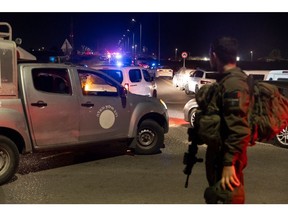Article content
(Bloomberg) — A Hezbollah drone strike killed four soldiers at a northern Israeli base, one of the deadliest attacks by the Iran-backed militia on the Jewish state in at least a year, as the army widens its offensive in southern Lebanon.
More than 50 others were injured in the Hezbollah assault on the military encampment south of the Israeli port city of Haifa on Sunday. The incident followed a weekend of sustained rocket salvos against the area that showed the militant group can still strike at least 40 kilometers (25 miles) into Israel despite weeks of attacks on its commanders and missile caches.
Article content
The US on Sunday pledged to provide Israel with an advanced missile shield to help its ally in a possible showdown with Iran, about two weeks after the Islamic Republic launched about 200 ballistic missiles that were mostly repelled.
The Hezbollah attack on Sunday underlines the threat Israel continues to face even after sending tanks and troops across the border into southern Lebanon. The area’s villages and dense forests have become the hardest-fought of several fronts in a more than year-old war between Israel and groups backed by Tehran whose humanitarian toll and disruptions to regional shipping are worrying world powers.
Israeli Defense Minister Yoav Gallant on Sunday said the army was targeting Lebanese border villages he alleged were the locations of Hezbollah tunnels and arms stockpiles. The group began shelling northern Israel on Oct. 8, 2023, a day after fellow militant organization Hamas attacked from Gaza, killing 1,200 people and kidnapping 200.
Border Attacks
“We have destroyed infrastructure in Beirut, in the Bekaa and across Lebanon, and now we are operating along the border,” Gallant said. He vowed to push Hezbollah permanently back from the frontier so tens of thousands of displaced Israelis could return to their homes.
Article content
Israeli strikes on southern and central Lebanon and the Bekaa valley on Sunday killed at least 51 people, one of the deadliest single days for the country in recent weeks, according to the Lebanese health ministry. Almost half that number were killed in the Chouf district, where many from Lebanon’s south had fled, it said.
A year of fighting in Gaza has left more than 41,000 Palestinians dead, according to the Hamas-run health ministry. Both Hamas and Hezbollah are designated terrorist organizations by the US. Almost 400 Israeli troops have died in fighting in Gaza and on the Lebanon front.
Hezbollah on Friday warned Israeli civilians to keep away from Israeli military facilities it said were located in cities like Haifa – an apparent attempt to echo the Israeli army’s evacuation instructions in Lebanon.
Israeli Prime Minister Benjamin Netanyahu is also urging United Nations peacekeepers to withdraw from southern Lebanon. Several were wounded last week in an incident that Israeli’s army said happened when it was trying to fire at Hezbollah positions.
On Sunday, the mission known as Unifil said Israeli tanks barged into one of its bases and remained for about 45 minutes, while some of its peacekeepers later needed treatment after being exposed to smoke from a nearby firing of weapons. Israel said one of its tanks backed up and emitted a smokescreen while under Hezbollah fire that wounded several soldiers, and that the army maintained coordination with Unifil during the incident.
Article content
While the Gaza war is now mainly close-quarters fighting, Israel is continuing to contend with aerial attacks from Lebanon, Yemen, Syria and Iraq. Iran’s Oct. 1 missile barrage was mostly foiled by Israeli air defenses, although there was property damage from interception debris.
Netanyahu’s government has promised significant retaliation is coming soon. That’s set off frenzied consultations with Washington which, while supportive of Israel’s right to respond, wants Iran’s nuclear facilities and energy sector spared.
Closing ranks, the Pentagon said a THAAD missile defense system – comparable to Israel’s high-altitude Arrow interceptor – would be deployed on its ally’s territory. That, Israeli experts said, would both bolster defenses and make it less likely to take unilateral action against Iran given the presence of US troops operating the local system.
Iranian Foreign Minister Abbas Araghchi was in Iraq on Sunday as part of a tour designed to drum up regional opposition to any retaliation by Israel that will also take him to Oman. He visited Saudi Arabia and Qatar last week.
—With assistance from Dana Khraiche.
Share this article in your social network

